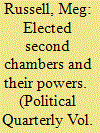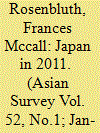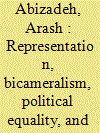| Srl | Item |
| 1 |
ID:
111662


|
|
|
|
|
| Publication |
2012.
|
| Summary/Abstract |
In May 2011, Britain's Conservative/Liberal Democrat coalition government published proposals for reform of the House of Lords. In a White Paper and draft bill they set out detailed plans for a largely or wholly elected second chamber. These marked the latest stage in a long-running debate on Lords reform. The government's proposals aim to change the composition of the second chamber, suggesting that there will be no change to its powers or the conventions governing relations with the House of Commons. But this expectation has been disputed. The House of Lords presently does not make full use of its powers, and many anticipate that it would if its members became elected. This paper reviews the composition of all second chambers internationally, showing that wholly directly elected chambers make up the minority, and that both mixed chambers and indirect election are common. It then reviews the formal powers of all largely and wholly elected chambers. This shows that amongst parliamentary systems the formal powers of the House of Lords are relatively great. But second chamber powers, as well as their composition, vary widely.
|
|
|
|
|
|
|
|
|
|
|
|
|
|
|
|
| 2 |
ID:
113904


|
|
|
|
|
| Publication |
2012.
|
| Summary/Abstract |
Japan's government under the Democratic Party of Japan has limped along for another year, hampered by a divided legislature and an aging population reluctant to pay for the pensions and services it requires. The natural disasters of March 2011 were a tragic sideshow to the deep political problems that continue to plague Japan.
|
|
|
|
|
|
|
|
|
|
|
|
|
|
|
|
| 3 |
ID:
181542


|
|
|
|
|
| Summary/Abstract |
The two traditional justifications for bicameralism are that a second legislative chamber serves a legislative-review function (enhancing the quality of legislation) and a balancing function (checking concentrated power and protecting minorities). I furnish here a third justification for bicameralism, with one elected chamber and the second selected by lot, as an institutional compromise between contradictory imperatives facing representative democracy: elections are a mechanism of people’s political agency and of accountability, but run counter to political equality and impartiality, and are insufficient for satisfactory responsiveness; sortition is a mechanism for equality and impartiality, and of enhancing responsiveness, but not of people’s political agency or of holding representatives accountable. Whereas the two traditional justifications initially grew out of anti-egalitarian premises (about the need for elite wisdom and to protect the elite few against the many), the justification advanced here is grounded in egalitarian premises about the need to protect state institutions from capture by the powerful few and to treat all subjects as political equals. Reflecting the “political” turn in political theory, I embed this general argument within the institutional context of Canadian parliamentary federalism, arguing that Canada’s Senate ought to be reconstituted as a randomly selected citizen assembly.
|
|
|
|
|
|
|
|
|
|
|
|
|
|
|
|